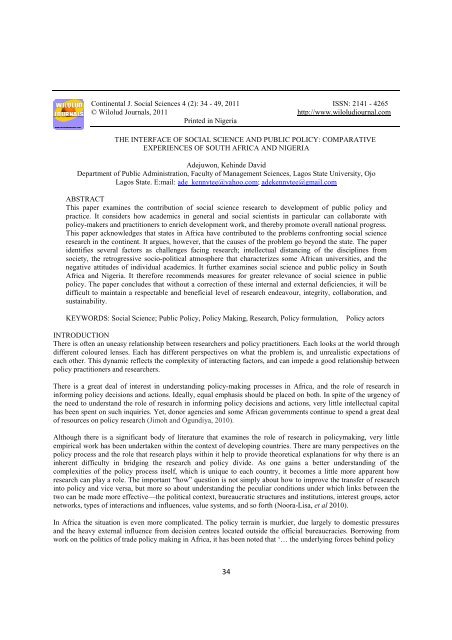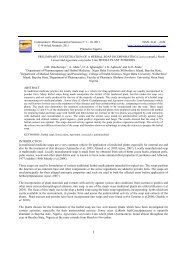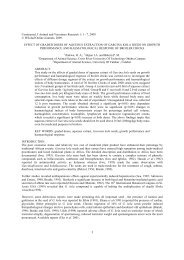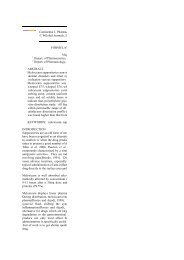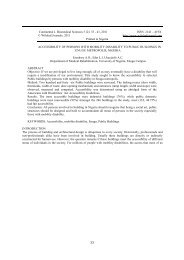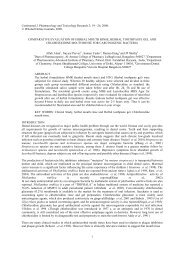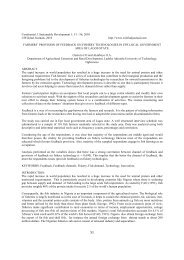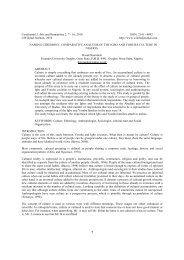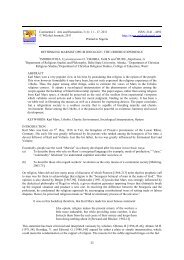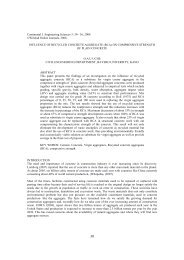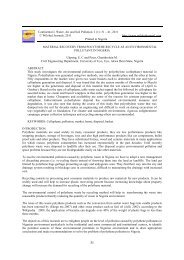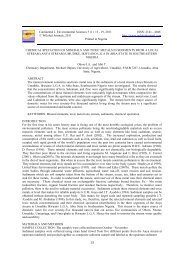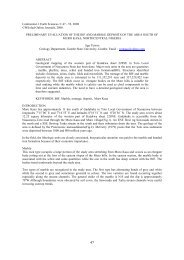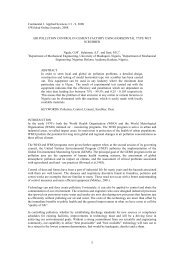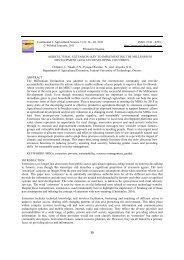Vol 4 _2_- Cont. J. Soc. Sci. - Wilolud Journals
Vol 4 _2_- Cont. J. Soc. Sci. - Wilolud Journals
Vol 4 _2_- Cont. J. Soc. Sci. - Wilolud Journals
Create successful ePaper yourself
Turn your PDF publications into a flip-book with our unique Google optimized e-Paper software.
<strong>Cont</strong>inental J. <strong>Soc</strong>ial <strong>Sci</strong>ences 4 (2): 34 - 49, 2011 ISSN: 2141 - 4265<br />
© <strong>Wilolud</strong> <strong>Journals</strong>, 2011 http://www.wiloludjournal.com<br />
Printed in Nigeria<br />
THE INTERFACE OF SOCIAL SCIENCE AND PUBLIC POLICY: COMPARATIVE<br />
EXPERIENCES OF SOUTH AFRICA AND NIGERIA<br />
Adejuwon, Kehinde David<br />
Department of Public Administration, Faculty of Management <strong>Sci</strong>ences, Lagos State University, Ojo<br />
Lagos State. E:mail: ade_kennytee@yahoo.com; adekennytee@gmail.com<br />
ABSTRACT<br />
This paper examines the contribution of social science research to development of public policy and<br />
practice. It considers how academics in general and social scientists in particular can collaborate with<br />
policy-makers and practitioners to enrich development work, and thereby promote overall national progress.<br />
This paper acknowledges that states in Africa have contributed to the problems confronting social science<br />
research in the continent. It argues, however, that the causes of the problem go beyond the state. The paper<br />
identifies several factors as challenges facing research; intellectual distancing of the disciplines from<br />
society, the retrogressive socio-political atmosphere that characterizes some African universities, and the<br />
negative attitudes of individual academics. It further examines social science and public policy in South<br />
Africa and Nigeria. It therefore recommends measures for greater relevance of social science in public<br />
policy. The paper concludes that without a correction of these internal and external deficiencies, it will be<br />
difficult to maintain a respectable and beneficial level of research endeavour, integrity, collaboration, and<br />
sustainability.<br />
KEYWORDS: <strong>Soc</strong>ial <strong>Sci</strong>ence; Public Policy, Policy Making, Research, Policy formulation,<br />
Policy actors<br />
INTRODUCTION<br />
There is often an uneasy relationship between researchers and policy practitioners. Each looks at the world through<br />
different coloured lenses. Each has different perspectives on what the problem is, and unrealistic expectations of<br />
each other. This dynamic reflects the complexity of interacting factors, and can impede a good relationship between<br />
policy practitioners and researchers.<br />
There is a great deal of interest in understanding policy-making processes in Africa, and the role of research in<br />
informing policy decisions and actions. Ideally, equal emphasis should be placed on both. In spite of the urgency of<br />
the need to understand the role of research in informing policy decisions and actions, very little intellectual capital<br />
has been spent on such inquiries. Yet, donor agencies and some African governments continue to spend a great deal<br />
of resources on policy research (Jimoh and Ogundiya, 2010).<br />
Although there is a significant body of literature that examines the role of research in policymaking, very little<br />
empirical work has been undertaken within the context of developing countries. There are many perspectives on the<br />
policy process and the role that research plays within it help to provide theoretical explanations for why there is an<br />
inherent difficulty in bridging the research and policy divide. As one gains a better understanding of the<br />
complexities of the policy process itself, which is unique to each country, it becomes a little more apparent how<br />
research can play a role. The important “how” question is not simply about how to improve the transfer of research<br />
into policy and vice versa, but more so about understanding the peculiar conditions under which links between the<br />
two can be made more effective—the political context, bureaucratic structures and institutions, interest groups, actor<br />
networks, types of interactions and influences, value systems, and so forth (Noora-Lisa, et al 2010).<br />
In Africa the situation is even more complicated. The policy terrain is murkier, due largely to domestic pressures<br />
and the heavy external influence from decision centres located outside the official bureaucracies. Borrowing from<br />
work on the politics of trade policy making in Africa, it has been noted that ‘… the underlying forces behind policy<br />
34
Adejuwon, Kehinde David: <strong>Cont</strong>inental J. <strong>Soc</strong>ial <strong>Sci</strong>ences 4 (2): 34 - 49, 2011<br />
epochs and episodes vary from country to country and from regime to regime weaved around ethnic, military or<br />
other ruling and bureaucratic interests in a manner that suggests a forced consensus … the loss of policy autonomy<br />
in most countries and the absence of the organized private sector as key players in the policy process compound the<br />
picture’.<br />
There is a renewed interest in the policy– research nexus in many countries, which appears to be more demand (via<br />
governments) than supply driven (Solesbury 2002). This suggests governments recognise their inadequate internal<br />
capacity and the need to evaluate what works in a fiscally constrained environment.<br />
The premise of this paper is influenced by views of scholars such as Adesina (2007) who, in his review of African<br />
policy experiences, concluded that most policy-making initiatives in Africa were influenced by the ‘nationalist’<br />
agenda of nation building and (economic) growth. Also, the view that the role played or not played by the state is<br />
critical for development or lack of it influences the approach this paper takes, especially since it is posited that the<br />
South African government has been relatively hands-on in both policy making and implementation or rather that the<br />
configuration of government since 1998 or so has lent itself readily to an active developmental state (Johnson,<br />
1999). This paper conceptualise social science and public policy, it examines the nexus between social science and<br />
public policy. The paper examines public policy in South Africa and Nigeria; the limitations of impact of social<br />
science on public policy were examined, while remedial actions for greater relevance of social science in policy<br />
making were proffered.<br />
SOCIAL SCIENCE AND PUBLIC POLICY: CONCEPTUAL EXPLANATIONS<br />
The social sciences consist of a variety of disciplines, subject areas, and methods. <strong>Soc</strong>ial science is that broad range<br />
of field that studies the society. Political science, <strong>Soc</strong>iology, History, Anthropology, Economics, Geography, etc. all<br />
provide their own, largely independent, definitions of scope, research agenda, and research methods. And there is no<br />
grand plan according to which the disciplinary definitions jointly capture all that is of scientific interest about the<br />
social sciences. The major social science disciplines have grown up in the past century and a half by creating<br />
stylized answers to these topic areas: the “political” concerns institutions of coercion and governance; the<br />
“economic” has to do with production, exchange, and distribution of goods and services; the “anthropological” has<br />
to do with the cultures, values, and practices through which individuals and groups conduct their local lives.<br />
Generally, social sciences engage in social research which is a systematic inquiry into social events/phenomena or<br />
processes. Fadeyi and Adedokun (2004: 1) averred that social research includes:<br />
Any research which has as its subject of investigation or inquiry, human groups, human nature, human<br />
relationships, human organization and human institutions…In broad sense social research is<br />
concerned with systematic gathering of data that can help us answer questions about various aspects<br />
of society and these can help us to understand society.<br />
The essence of social research is to contribute to the store of knowledge about human society in order to solve<br />
certain confronting problems. Such investigation needs to influence formulation of programs that are meant to<br />
address those problems.<br />
Enough has been written about definitions of public policy. Academics continue to contemplate the definition of<br />
public policy, since there is currently no consensus. As Howlett and Ramesh (2003) put it, there are many competing<br />
definitions of public policy. The study of public policy began in 1922, when Charles Merriam, a political scientist,<br />
sought to build a link between political theory and its application to reality. Numerous issues are addressed by public<br />
policy, including crime, education, foreign policy, health, and social welfare. Thomas Dye opines that it is<br />
“whatever governments choose to do or not to do”. By this, “action” or “inaction” both define public policy (cited in<br />
Adesina, 2008). The Longman`s Dictionary of <strong>Cont</strong>emporary English defines policy as “a plan or course of action in<br />
directing affairs, as chosen by a political party, government, business company, etc.”.<br />
Public policy in the view of Gumede (2008) is defined broadly as all formal and publicly known decisions of<br />
governments that come about through pre-determined channels in a particular administration. Properties of this<br />
definition would readily lend themselves to scrutiny but, given limited space and time, this paper cannot unpack<br />
35
Adejuwon, Kehinde David: <strong>Cont</strong>inental J. <strong>Soc</strong>ial <strong>Sci</strong>ences 4 (2): 34 - 49, 2011<br />
these. Moran, Rein and Goodin (2006) view public policy ‘as the business end of political science, where theory<br />
meets practice in the pursuit of the public good’. Public policy is an attempt by the government to address a public<br />
issue. The government, whether it is city, state, or federal, develops public policy in terms of laws, regulations,<br />
decisions, and actions. There are three parts to public policy-making: problems, players, and the policy.<br />
The problem is the issue that needs to be addressed. The player is the individual or group that is influential in<br />
forming a plan to address the problem in question. Policy is the finalized course of action decided upon by the<br />
government. In most cases, policies are widely open to interpretation by non-governmental players, including those<br />
in the private sector. Public policy is also made by leaders of religious and cultural institutions.<br />
For the purposes of a better understanding in this paper, we will adopt the definitions of a policy as defined by<br />
DeConing (2006) and Gumede, (2008). DeConing (2006) defines a policy, as a statement of intent, which articulates<br />
basic principles to be pursued to attain specific goals and actions. DeConing goes on to say that policy interprets the<br />
values of society and is usually followed by pertinent project and program management actions related to<br />
implementation. Thus, policies when formulated must be implemented to achieve the set goals and objectives.<br />
One may summarise its conceptualization by identifying the following salient characteristics of public policy:<br />
Public policy is purposive and goal-oriented.<br />
It consists of courses or patterns of action by government officials.<br />
Public policy is what government actually do...not what they intend to do, or say they are going to do.<br />
Public policy can be either positive or negative in form i.e government overt action or a decision by<br />
government officials not to take action.<br />
It is based on law, and is authoritative.<br />
The purposes and objectives of policies are to promote the professed values and goals of the society as identified and<br />
defined by the political leadership. Public policies are the expression of political systems goals and the means with<br />
which it purse them. The content of policies is the political actions programmes designed to purse such values, goals<br />
and aspirations.<br />
SOCIAL SCIENCE AND PUBLIC POLICY: WHAT NEXUS<br />
The role of social science in policy formulation and the question of how to use social science research and expertise<br />
in policy making is one of the recurring issues facing social scientists across the globe. Hence, the roles, which<br />
social scientist expected to play for the success of any public policy either by the government or private<br />
organizations, can never be over-emphasized. In addition, research is a process of discovering new or additional<br />
useful information. This makes research central to the policy-making process in the efforts to bring about sustainable<br />
development. The need for research derives either from insufficient information, which does not lead policy makers<br />
to definite conclusion and policy direction, or from lack of information on an issue of public concern for which a<br />
policy action is eventually desired.<br />
The research-policy nexus is not linear, even in advanced countries, and even when governments of those countries<br />
are funding the research. Weiss (1995) noted the haphazard connection between social science research and policy<br />
making in the United States, and the misguided belief by many social scientists involved in policy research that the<br />
results of their work would be used by the government. Weiss observed that they ‘tend to believe that if officials<br />
ignore relevant research, they are either ignorant, uncaring, or overtly “political” in the pejorative sense of the<br />
word’. This means that in assessing the research-policy interface, a fair amount of value must be assigned to<br />
serendipity and knowledge externalities that may not be readily captured and quantified.<br />
In the view of Jimoh and Ogundiya (2010) three important points have emerged with respect to the research-policy<br />
interface. First, it is useful to have a market for contestation of policy ideas. Second, policy entrepreneurship is<br />
critical in bridging the research–policy gap. Third, policy research priority setting involves many players and can be<br />
demand or supply driven, depending on the coalition for policy change and the institutional arrangements on the<br />
ground. In Africa, all of these conditions have, for the most part, been either weak or absent.<br />
36
Adejuwon, Kehinde David: <strong>Cont</strong>inental J. <strong>Soc</strong>ial <strong>Sci</strong>ences 4 (2): 34 - 49, 2011<br />
The goal of social sciences is to traverse the array of social, political, economic and environmental problems facing<br />
the human race. Without reversing the trend in the array of these problems, the human society will be anarchical and<br />
inhuman for human survival (Jimoh and Ogundiya, 2010). It is in this light that social sciences dabble into the<br />
mainstream of vigorous systematic investigation of the etiologies, patterns and consequences of these socio-political,<br />
economic and environmental problems so that appropriate strategies will be developed to curtail them. As regards<br />
this investigation, social sciences operate at two distinct but interrelated levels the conceptual-theoretical and<br />
observational-empirical (Nachimias and Nachmia 1991).<br />
David Blunkett, (then) Secretary of State for Education and Employment in the United Kingdom, has expressed a<br />
policy practitioner’s view in terms of his government’s frustration about the tendency for research to ‘deal with<br />
issues other than those which are central and directly relevant to the political and policy debate; fail to take into<br />
account the reality of many people’s lives when identifying the research questions; or be seemingly perverse – when<br />
research does try to be directly relevant to the main policy and political debates, it is often ‘driven by ideology<br />
paraded as intellectual inquiry or critique, setting out with the sole aim of collecting evidence that will prove a<br />
policy wrong rather than genuinely seeking to evaluate or interpret impact’(Blunkett, 2000). In response, the<br />
researcher refer to lack of government interest in, or even knowledge of research that is available and relevant;<br />
impediments to researchers accessing data held within bureaucracies; insufficient effort by government in<br />
identifying and publicising policy priorities; an anti-intellectual approach adopted within government; a risk-averse<br />
attitude to findings that practitioners could see as embarrassing to the Minister, resulting in a wariness of critical<br />
analysis; short time-frames under which governments operate, resulting in a preference for immediate<br />
‘instrumentalist’ policy advice; and a lack of incentives for researchers to produce policy relevant material.<br />
These two positions reflect quite different frames of reference. Caplan (1979) has coined the phrase ‘two<br />
communities’ to depict the cultural divide between social science and policy. Indeed, communication as well as<br />
culture could be expected to be at the heart of any divide between the world of social scientist and policy<br />
practitioner.<br />
From the above, it shows that there is a troubled relationship between social science and public policy. Because of<br />
the focus of study in social sciences, it is expected that the outcome of social science researches should translate to<br />
social action. But this is not so in reality, as the interface between social science and public policy is weak.<br />
In Nigeria, the best evidence for the disconnection between social science and public policy is in the level of<br />
development in the country. For example before the recent crisis in the financial sector, various research findings by<br />
experts have sought to draw the attention of the regulators to various warning signals that all is not well in the<br />
sector. Some of the findings show that the reported profit level of most of the banks is at variance with other<br />
economic indices. Because of the inappropriate interface between policy research and public policy, theses warnings<br />
were not heeded by the regulators. The outcome was the crash in the stock market and instability in the financial<br />
institutions.<br />
There are three main avenues through which social scientists can, in the course of their professional duties, interact<br />
with other members of the society. <strong>Soc</strong>ial scientists may teach and enlighten both students in the universities and<br />
adults in the wider society. Secondly, social scientists may influence other societal members through their research<br />
and writing or publications. And thirdly, social scientists may interact with policy makers through the playing of<br />
roles as consultants, advisers, planners, commissioners and direct government officials in the civil service (Sanda,<br />
1981:4). With respect to contemporary Nigerian society, social scientists have been most influential with respect to<br />
the third area of interaction with policy makers. It is probably necessary to elaborate on each of these aspects.<br />
<strong>Soc</strong>ial scientists conduct researches into different aspect of social and economic progress in Africa and they publish<br />
such findings in both local and international journals. In Nigeria, for instance the foremost among the local journals<br />
utilised as a medium of communication with policy makers and the rest of the society are the Nigerian Journal of<br />
Economic and <strong>Soc</strong>ial Studies, Quarterly Journal of Administration, ASCON Journal of Management, Journal of<br />
African Studies, etc.<br />
37
Adejuwon, Kehinde David: <strong>Cont</strong>inental J. <strong>Soc</strong>ial <strong>Sci</strong>ences 4 (2): 34 - 49, 2011<br />
Additionally, social scientists, because of the requirements for upward mobility within the academic community,<br />
publish a great deal of their research findings in foreign journals of high academic repute. In relation to direct<br />
participation in policy formulation and execution, the most influential social scientists are those in full employment<br />
in the public service. These people have had different degree of input into policy at different points in the planning<br />
and development process.<br />
Policies do not just evolve, they are based on available precedence and evidence. Such evidence usually emanates<br />
from various research findings which inform the policy makers about the direction of events. This signifies that part<br />
of the function of the body discipline of (social sciences) is to unfold social milieu about problems confronting the<br />
society. This will definitely influence policy formation to address societal problems.<br />
Oronsaye (1995) observed that the importance of basing policy on knowledge has been recognized in every<br />
civilization. The diagram below shows the cyclic nexus of research and policy. The figure depicts that research<br />
provides cesspool of knowledge required to formulate, modify and evaluate any policy. Even in monitoring the<br />
implementation of the policy, systematic investigations are needed. This signifies a reciprocal relationship between<br />
research and policy as policy formulation is not an end in the continuum process but a means to an end as researches<br />
are needed to evaluate, modify, monitor and (even) change the policy.<br />
Output<br />
Research<br />
Policy<br />
Formulation/Modification<br />
Theoretical<br />
& Empirical<br />
Observation<br />
Research<br />
Problem<br />
<strong>Soc</strong>ial, Political<br />
Economic<br />
Discrepancies<br />
Human<br />
Concern<br />
Research-Policy Nexus (Adapted from Jimoh and Ogundiya, 2010).<br />
This also stipulates that a policy could be archaic. The human society is dynamic, so also all social remedies need to<br />
respond to the dynamics. <strong>Soc</strong>ial research exposes such dynamics, patterns and dimensions. This thereby sets<br />
direction and adequate knowledge–base for the formulation of a new policy or modification of existing ones (Jimoh<br />
and Ogundiya, 2010).<br />
38
Adejuwon, Kehinde David: <strong>Cont</strong>inental J. <strong>Soc</strong>ial <strong>Sci</strong>ences 4 (2): 34 - 49, 2011<br />
There is an urgent need to explore the interface and the complementarity between social science research and the<br />
policy-making process. Critics complain that academic knowledge does not easily or necessarily translate to<br />
practical wisdom and action because of the many deficiencies in the methods of generating, communicating and<br />
utilizing this knowledge (Bathgeber, 1988; Glover, 1995; MacNeil, 1990). Research tends to be supply-and not<br />
demand-driven. On the supply side some of our institutions of higher learning are still very patterned along inherited<br />
colonial lines, and tend to hold on to the old ideals of the pursuit of knowledge for its own sake, or the limited<br />
objective of producing an indigenous elite for the decolonization and Africanization process. This influenced the<br />
form and content of the curriculum, which paid very little attention to direct problem-solving or to the professions as<br />
the concern of higher education (Sawadago, 1995; Ngara, 1995).<br />
Now governments’ donor agencies and private sector interests are becoming impatient with academic research and<br />
learning not related or only remotely related to the practical problems of development. Research is often carried out<br />
in a fragmented and narrow discipline-based manner, and research results, often influenced by ideological<br />
differences among feuding scholars, are usually ambiguous, inconclusive and sometimes even contradictory.<br />
Findings are typically too critical, offering few concrete suggestions or clear options to guide policy choices. The<br />
quality of scholarship and of the knowledge generated is now constrained by the limited exposure of our social<br />
scientists to current literature and modern analytical techniques, and their isolation from global discourse and trends<br />
in their fields.<br />
This would not entirely eliminate the many barriers that get in the way of effective collaboration between<br />
researchers and policy-makers since both sides traditionally approach their tasks differently. Policy-makers and<br />
politicians are usually under pressure to produce results quickly, social scientist tends to be more systematic,<br />
reflective and therefore slow. Academic researchers do not sufficiently anticipate problems and prescribe preventive<br />
measures, and there appears to be very little link between the process of doing research and the implementation of<br />
research findings. As well, policy-makers are asking for policy-relevant research and knowledge ‘generated and<br />
sustained in the context of application, and not developed first and then applied to that context later by a different<br />
group of practitioners’ (Gibbon, 1998). They are looking for more ‘flexible ways of integrating research into<br />
programmes so that the benefits from learning can be applied during, not after the events’ (AID-Watch, 1999). This<br />
is a departure from or perhaps just an extension of the traditional practice that assumes that:<br />
It is mistaken to expect university research to produce marketable results, for it is essentially<br />
fundamental research. It is the entrepreneur who can convert the fundamental research findings into<br />
commercial products through applied research conducted in their own laboratories or undertaken in<br />
the universities under their sponsorship (Biobaku, 1985).<br />
Policy-makers ad practitioners on the demand side also create problems for the dialogue and co-operation that<br />
should exists between them and academic researchers. They often seem to regard academic research contemptuously<br />
as esoteric, and as not taking into account the politics and economics of policy-making, which involve reconciling<br />
conflicting social and commercial interests. Objective and scientifically based research findings may turn out to be<br />
politically awkward or commercially inconvenient to these various vested interests. For this reason it is common for<br />
government or business interests to hire their own consultants or set up their own commissions of inquiry or task<br />
forces (suitably composed), with specified terms of reference, to look into this or that matter, and provides policy<br />
advice. Such a report is then vetted, and a ‘white paper’ issued to guide official decisions and action.<br />
There is a further and even more worrying concern that both researchers and policy-makers do not take sufficiently<br />
seriously the interests and views of the people whom research and development are meant to benefit. ‘Much<br />
conventional research is useless because it is for the satisfaction of the researcher rather than the researched’<br />
(Edwards, 1989). This is the basis for the call for a more participatory and bottom-up approach to research and<br />
development, and a more active outreach and extension component of our development studies programmes.<br />
39
Adejuwon, Kehinde David: <strong>Cont</strong>inental J. <strong>Soc</strong>ial <strong>Sci</strong>ences 4 (2): 34 - 49, 2011<br />
The above point summarise the troubled relationship that exist between social science and public policy. The effect<br />
of non-utilisation of research findings is seen in the poor level of development. It is important to state that this poor<br />
relationship is not peculiar to developing societies, it is a global phenomenon.<br />
However, the measure of impact of social science on policy in Africa, must include not just the participation of<br />
social scientists in policy making, but also the results of policy and the extent which policy is informed by social<br />
sciences research findings<br />
OVERVIEW OF THE POLICY PROCESS IN SOUTH AFRICA<br />
This section briefly depicts the policy-making process in South Africa, and the role played by various institutions,<br />
with added attention to non-state actors. One of the key institutions, besides parliament, is the Policy Co-ordination<br />
and Advisory Services (Policy Unit) in the state presidency. It not only deals with policy making and its various<br />
components (such as policy analysis, policy coordination and policy advice), but also leads to medium- to longrange<br />
planning as well as government-wide monitoring and evaluation. In brief, the Policy Unit provides research,<br />
analytical, advisory, policy, project/programme and strategic support to the presidency and government as a whole<br />
on matters of socioeconomic development, justice, governance and international affairs. It comprises five main<br />
policy sectors: economic, social, justice, crime prevention and security, international relations, and governance and<br />
administration. There are three additional units: monitoring and evaluation; planning; and special programmes<br />
(which deal with issues related to gender, disability and children’s rights). There is also a youth desk, which deals<br />
with youth development issues. Mirroring policy sectors are the five Forum of South African Directors-General<br />
(FOSAD) clusters. The Policy Unit works very closely with the FOSAD clusters and acts as a link between them<br />
and cabinet committees (Gumede, 2008).<br />
During the apartheid era, particularly in the period of the Premiership of P.W. Botha (as Prime Minister 1979-84,<br />
and as State President 1984-89), the policy-making process in South Africa was significantly militarised. This<br />
occurred mainly through the mechanism of the National Management System, at the apex of which was the State<br />
Security Council, and which provided military, intelligence and defence officers and officials with considerable<br />
leverage over the policy process. A militaristic `Total Strategy’ became the organising principle of policy – this<br />
essentially argued that all activities of state and society had to be orchestrated through a counter-revolutionary<br />
security agenda aimed to preventing a `communist’ takeover.<br />
As might be expected, the military came to dominate national security and defence policy-making during the Botha<br />
era. Without a functioning Ministry of Defence, defence policy was largely the preserve of the defence general staff,<br />
under the overall purview of the Minister of Defence, General Magnus Malan, who himself had been the Chief of<br />
the South African Defence Force (SADF). Defence policy-making was carried out in a closed and secretive<br />
environment in which little public or political consultation took place (Cawthra 1986).<br />
With the advent of the Premiership of F.W. de Klerk and the onset of negotiations to end apartheid, a rapid reduction<br />
in the policy influence of the military occurred and the Total Strategy framework was largely discarded. The period<br />
1990-94 saw multi-party negotiations which culminated in the establishment of the Transitional Executive Council<br />
(TEC) which oversaw the first universal democratic elections in South Africa in April 1994. During this period,<br />
defence policy was radically challenged and reviewed, both in the negotiating forums and also in civil society. A<br />
range of non-governmental organisations, many of them newly established, became involved for the first time in<br />
defence policy-making and a window of opportunity was opened for academics and other experts who had<br />
previously been marginalised from the defence process. This was a period of considerable policy fluidity and was<br />
characterised by a fairly open-ended debate, although at a formal level defence policy was to some extent protected<br />
from wider transitions, and `ring-fenced’ by the main actors in the interests of stability.<br />
The Government of National Unity was installed in May 1994 and led by the African National Congress (ANC)<br />
instituted a major policy revision soon after its establishment in May 1994, in which a new White Paper on Defence<br />
was drawn up. This resulted in the adoption of a new security paradigm - `human security’, which replaced the old<br />
Total Strategy framework. NGOs played a crucial role in drawing up the White Paper, but it will be argued that<br />
although public consultations took place, the process was in fact the preserve of small elite of defence experts. The<br />
40
Adejuwon, Kehinde David: <strong>Cont</strong>inental J. <strong>Soc</strong>ial <strong>Sci</strong>ences 4 (2): 34 - 49, 2011<br />
parliamentary defence committees - especially the Joint Standing Committee on Defence (JSCD) drove this process,<br />
while the role of civil servants in the Ministry of Defence was minimal.<br />
South Africa made a commitment in 1994, through the Reconstruction and Development Programme (RDP), to<br />
meeting basic needs, building the economy, democratising the state and society, developing human resources, and<br />
promoting nation building. Since then, the country has experienced a stable democracy, entrenchment of freedom, a<br />
growing economy and steady progress in bringing a better life to all. Over and above material conditions, there are<br />
improvements in areas such as national identity and relatively higher levels of social cohesion, in terms of unity,<br />
coherence, functionality and pride. The country has, to some extent, been exemplary in mitigating racial, ethnic and<br />
cultural tensions, in redressing decades of discrimination and underdevelopment, and in redefining and pursuing a<br />
collective national vision. South Africa is a nation that has harnessed meagre resources towards improved human<br />
development, at little disruption to the economy and the lowest costs to future generations, in a collective effort that<br />
addresses the ugly political history and its legacy (Gumede, 2008).<br />
South Africa is building its democratic institutions from scratch," Drake said. "As democracy puts roots deeper into<br />
South African soil, we expected -- and have seen -- growth in public policy-related disputes. This is a positive sign,<br />
because formerly disenfranchised groups now have the ability to contest government policies through participation<br />
rather than violence."<br />
South Africa finds itself in one of those rare situations in which there is enormous opportunity; but also great<br />
uncertainty about outcomes," Bellman (2008) observed that, "Successful implementation of collaborative problem<br />
solving systems can greatly enhance South Africa's ability to secure its future. During our mission, we found a<br />
strong appetite at all levels of government for dispute resolution systems. That is most encouraging."<br />
Collaborative problem solving to implement established policy has very little history in South Africa, if any at all,<br />
Carlson (2009) also noted;<br />
In the past, negotiation has typically been limited to narrowly defined issues with only two parties,<br />
such as labour-management matters. Based on what we learned in our recent mission, we believe that<br />
the State Office of Mediation model can be adapted to assist in introducing collaborative approaches<br />
to dealing with disputes over policy implementation in South Africa.<br />
A significant element of the policy-making and implementation process in South Africa is the involvement and/or<br />
participation of non-state actors – what public policy literature refers to broadly as quasi-autonomous nongovernmental<br />
organisations (‘quangos’). The South African policy-making process provides ample room for<br />
participation of the public, in its various forms. This approach is in accordance with the democratic nature of the<br />
government, giving voice and respect to the governed from various sectors, and from all walks of life. In a quest to<br />
achieve impartiality and independence of views of the public, government, as mandated by the Constitution, has put<br />
in place several institutions to strengthen constitutional democracy. These institutions account to the NA and include<br />
the Public Protector, the South African Human Rights Commission, the Commission for the Promotion and<br />
Protection of the Rights of Cultural, Religious and Linguistic Communities, the Commission on Gender and<br />
Equality, the Youth Commission, and the Electoral Commission. Although these are state institutions, the<br />
Constitution protects their independence by allowing them to contribute to the policy making, implementing and<br />
monitoring process ‘without fear, favour or prejudice’ for the sectors that these institutions represent (Gumede,<br />
2008).<br />
Although the integrated governance system requires further interrogation, it could tentatively be concluded that<br />
South Africa has established ideal institutions for the policy-making process. Overall, South Africa encapsulates<br />
most of the salient features of a democratic developmental state which is seen as a state that is active in pursuing its<br />
developmental agenda, working with social partners, and has the capacity and is appropriately organised for its<br />
predetermined objectives (Gumede, 2008).<br />
41
Adejuwon, Kehinde David: <strong>Cont</strong>inental J. <strong>Soc</strong>ial <strong>Sci</strong>ences 4 (2): 34 - 49, 2011<br />
SOCIAL SCIENCE AND POLICY FORMULATION: THE NIGERIAN EXPERIENCE<br />
How research contributes to the policy process in developing countries in general, and in Nigeria more specifically,<br />
is not well understood. Yet such understanding is a critical part of doing effective policy research. The ultimate aim<br />
of policy research is to have an impact on policy. However, making the link between policy research and policy is<br />
not straightforward without an understanding of the underlying policy process and how policy research plays a role<br />
in that process (Noora-Lisa Aberman, et al, 2010).<br />
One of the ways by which the successive government in Nigeria since independence have been trying to better the<br />
socio-economic conditions of Nigerians and narrow the gaps between it and advance countries of the world, is to<br />
formulate and execute policies which are “pragmatic” in nature (Olaniyi, 1998). He noted further that such policies<br />
often take different forms – political, economic, social,, etc and they differ from regime to regime. In fact, it can be<br />
asserted here that the adoption of these policies have become a political contest and any new regime which fails to<br />
evolves its own strategy will be deemed by Nigerians as lacking national orientation.<br />
The research-to-policy linkages in Nigeria have been generally described as weak (Olomola, 2007). A few factors<br />
have been cited for the low uptake of research by Nigerian policymakers. The first has to do with the lack of highquality<br />
research. Compared with other African countries, Nigeria is home to a relatively large number of policy<br />
research institutions and think tanks.<br />
The second factor according to Noora-Lisa, et al (2010) is the apparent disconnect between researchers and<br />
policymakers. There is little interaction between policymakers and researchers. Thus, meaningful discussion of<br />
available research findings, their suitability to policy-related problems, and identification of other policy areas<br />
requiring research attention is severely lacking. In some cases, policymakers do not have confidence in research<br />
findings, probably due to doubtful methodology or the highly technical language used by researchers (Obada and<br />
Uga, 2002:515). Closely related is the problem of mutual suspicion between the researchers and policymakers.<br />
Policymakers have often been alleged to hoard information needed for policy research, and researchers have been<br />
accused of abusing classified information divulged to them. The only aspect of a linkage between research and<br />
policy is the dissemination of research findings, but most policymakers hardly attend dissemination seminars and<br />
workshops, or they send their representatives with little or no caliber to contribute to policy debate (Olomola, 2007).<br />
These according to Hansohm (2003) has been described those as generally weak and unreliable. This has been<br />
attributed to many years of military rule, bad governance, and a high level of corruption, especially in the late 1980s<br />
and early 1990s when most Nigerian research establishments suffered from inadequate funding, decay of<br />
infrastructure, and a flight of highly qualified academics to Western institutions (Centre for African Policy and<br />
Peace Strategy, 2007). The latter—often referred to as “brain drain”—remains a critical challenge facing local<br />
research institutes in Nigeria.<br />
Insufficient use of available research-based in policy is the third factor. Obadan and Uga (2002) suggest that the<br />
insufficient use of available research-based information in public policy-making leads to disenchantment by policy<br />
researchers. In this context, policy researchers may redirect their efforts toward research that does not necessarily<br />
address social and development problems but rather adds to their publications or contributes to an ongoing<br />
intellectual debate. Supporting that theory, a recent study conducted to ascertain causes of poor research output<br />
among Nigerian academics identified the lack of use of research findings by policy practitioners as most critical<br />
(Egwunyenga 2008).<br />
However, the return to civil rule in 1999 ushered in a stronger role for research in policymaking by facilitating the<br />
inclusion of more academic and policy expertise into the policy process.<br />
Since the beginning of the present democratic dispensation public policy have been identified and formulated for<br />
adoption by the executive arm of government to the knowledge of some top government, party leaders. Usually, the<br />
Presidency through a committee of policy analysts assists in the formulation efforts. The strategy of policy<br />
announcement is usually made through the media press conference, interview or an important non political body like<br />
the National Council of States which has authority to legislate on the matter.<br />
42
Adejuwon, Kehinde David: <strong>Cont</strong>inental J. <strong>Soc</strong>ial <strong>Sci</strong>ences 4 (2): 34 - 49, 2011<br />
Beginning with President Obasanjo’s administration, from 1999 to 2007, technocrats with sound academic<br />
backgrounds and strong advocacy for the inclusion of research output in the policymaking process formed part of<br />
the cabinet. Some policy programs initiated by Obasanjo included the Nigerian development agenda, the National<br />
Economic Empowerment and Development Strategy, the establishment of the Institute for Peace and Conflict<br />
Resolution (a government think tank), and the annual presidential strategic retreat. All these initiatives received<br />
substantial inputs from policy experts, thereby providing a link between academic researchers and policy-makers.<br />
Even though this effort has started creating an interface between researchers and policymakers, research has not<br />
been directly used for policymaking largely due to poor political will and limited political value of research in the<br />
policy process (CAPPS, 2007). As a way of bridging the gap between policy and practice, there is need for further<br />
research to develop and facilitate effective strategies for participatory, transparent, and evidence-based policymaking<br />
in Nigeria.<br />
How research can feed into the policy process in developing countries in general, and in Nigeria more specifically,<br />
is not well understood. Yet that understanding is a critical part of doing effective policy research. A key challenge<br />
for research organizations in Nigeria, therefore, is to improve their understanding of the policy process, their<br />
interactions with policymakers, what information they will use and in what form, and with whom they should<br />
establish interactions.<br />
SOME LIMITATIONS ON THE POSSIBLE IMPACT OF THE SOCIAL SCIENCE ON PUBLIC POLICY<br />
Policy making in Africa in the 1980s and 1990s was dominated by what is widely known as the “Washington<br />
consensuses”. By implication, two institutions in Washington, the International Monetary Fund (IMF) and the World<br />
Bank, agreed on both the diagnosis for the lack of economic progress in Africa and the preferred solutions. Needless<br />
to say, African leaders and peoples were not consulted; they disagreed significantly with both the analysis of the<br />
problems and the solutions that the two institutions forced them to adopt. The neoclassical thinking and the market<br />
fundamentalism so central to the Washington consensus did not allow for any alternative view. African<br />
governments, by then heavily indebted and reliant on the IMF and the World Bank to bail them out of their<br />
economic quagmires, capitulated and reluctantly adopted their policies. The ideas and knowledge from Washington<br />
were backed by financial resources, and the role of the IMF as the global arbiter of good policies precluded access to<br />
other external sources of finance if a country’s rating, in their judgement, was unsatisfactory (Soludo, et al, 2004).<br />
The troubled relationship between social science and public policy is more pronounced in Nigeria. It is not obvious<br />
if research outcome is having impact on social action. The failure to establish a connection between policy and<br />
social research in developing countries has resulted in what is “the failure prone thesis”. The failure prone policy<br />
process thesis argues that policy makers in the developing nations are guilty of setting unrealistic goals. According<br />
to Albert Hirschman, “the fundamental problem of developing nations lies in the ability of their policy makers to<br />
make decisions that will include development due to psychological and social structural inadequacies that inhibit<br />
them from bringing to bear the needed amount of knowledge and commitment to make proper judgements about the<br />
allocation of resources”. He further argues that the choice of policy that developing countries made compounds the<br />
failure of policy for two reasons. First, developing countries hardly posses government with the policy making<br />
apparatus adequate to the task of producing a comprehensive programme. Second, this inadequacy is met with the<br />
introduction of policy solution from elsewhere, usually from advanced economies, solution which are hardly<br />
suitable to local problem (Adesina, 2008).<br />
There are practical examples of policies in Nigeria which are copied from developed country or are adopted from<br />
those designed by international organisations like World Bank, United Nations etc. Policies in Nigeria are affected<br />
more by research outcome from foreign study and most often by foreign scholars. This is one of the reasons why<br />
public policy often failed in Nigeria. The Structural Adjustment Programme (SAP) policy in the 1980s was adopted<br />
from the International Monetary Fund policy papers. The implication of this on the suppose nexus between social<br />
science and public policy is the undermining of local intellectual resources to act on local problems. It also deepens<br />
the underdevelopment of local talents and deprives them of the opportunity to master the problems on their own<br />
terms. Ideally, there is a basis for linkage between social science and public policy. Halpern shows the importance of<br />
social science research in informing public policy. She emphasises benefits of social science research to include<br />
improved quality of life, motivating learning, reducing crimes among many others. Rob Niji, a director at the<br />
Netherland Institute for <strong>Soc</strong>ial research points out the need for social science researcher to help policy makers find<br />
43
Adejuwon, Kehinde David: <strong>Cont</strong>inental J. <strong>Soc</strong>ial <strong>Sci</strong>ences 4 (2): 34 - 49, 2011<br />
acceptable solution to the societal problems. Cobin (2009) also suggests that academic social scientist should strive<br />
to engage in what they called policy-relevant research. This is consistent with many economists and political<br />
scientists who are oriented towards the popular Austrian economics and Chicago school.<br />
A critical factor which conditions public policy in developing countries generally is economic dependency which is<br />
a feature of post-colonial societies. Adesina (2008) states that a dependency economy coheres in a dependent state,<br />
together they breed a category of policy makers who are materially weak and who crave political power in order to<br />
amass wealth. The implication of this linkage is that public policies are made on the basis of political considerations.<br />
There are numerous factors which militate against the social sciences having the degree of impact that these<br />
disciplines could have had on policy. Some of these factors are concerned within the practitioners of the disciplines,<br />
as well as their tools of research and analysis. Other factors are inherent in the nature of African society with its<br />
characteristically endless power struggle in a basically anti-intellectualist environment.<br />
Firstly, there is the limitation imposed by basically western and received theories in all the social sciences. Professor<br />
Phillips (1979) has put the problem briefly but accurately;<br />
To date, much of social science research in Nigeria revolves around received theories. Specifically,<br />
the emphasis has been on testing the applicability to the country of theories developed in and received<br />
from the more economically advanced countries to such a low level that the next logical step is to<br />
develop what in essence amounts to new theories, test these and then base policy prescriptions on<br />
them; to date, social scientists demonstrate through empirical tests the inapplicability of several<br />
received theories but then stop short of the substitution process mention above. The upshot, of course,<br />
is that the researcher has nothing to offer to the policy makers.<br />
Secondly, even in situations where empirical researches have been embarked upon, the professional requirements of<br />
the social scientist and their considerations of requirements for mobility frequently lead to the utilisation of vague,<br />
specialised and sophisticated methodologies and language of communication, all of which act as barriers to effective<br />
communication with would be users of findings of social scientists. The use of academic jargons and the adoption of<br />
complex models and methodologies by social scientists through repulsive and alienating to policy makers, represent<br />
such a mark of professionalism and academic excellence to the older social scientists that these phenomena may<br />
continue to widen the gorge between the producers and users of social science knowledge for a long time (Sanda,<br />
1987).<br />
Thirdly, the over-dependence on the academic journals with restrictive circulation, and to which most policy<br />
makers do not subscribe, further limits the access of policy makers to the research findings of social scientists.<br />
Again, in view of the great premium placed on academic journals by social scientists, the latter have in the main<br />
been talking to each other, to the exclusion of most of the policy makers.<br />
Fourthly, and perhaps most important social scientists in this society do not engage in long term policy oriented<br />
researches partly as result of their obsession with publishing results of short-term researches in an academic<br />
environment dominated by the publish or perish syndrome, and partly for other reasons which include, inadequate<br />
funding and lack of adequate societal support for social research.<br />
All the above mentioned constraints are internal to the social science disciplines and practitioners. They partly reflect<br />
the absence of an in-depth knowledge of the socio-structural environment within which social scientists are<br />
functioning. Apart from the internal constraints, there are also limitations which inherent in the nature of African<br />
society. First and foremost is the paucity and unreliability of statistical data in Africa. The inadequately organised<br />
and uncoordinated production of statistics acts as a major constraint to their use by policy makers. For instance, Idele<br />
(1991) observed that:<br />
44
Adejuwon, Kehinde David: <strong>Cont</strong>inental J. <strong>Soc</strong>ial <strong>Sci</strong>ences 4 (2): 34 - 49, 2011<br />
Lack of statistically trained personnel... and the general public apathy towards statistical studies,<br />
scarcity of up-to-date and reliable data... the uncooperative attitude of industrial organisations and<br />
government organs having to do with those materials, lack of data processing facilities... the sheer<br />
size of country...all these constitute some of the well known problems facing statistics in Nigeria today<br />
Also, there is the impatient and frequently indifferent attitude of policy makers in the public sector as far as<br />
research is concerned. Part of the policy makers’ attitude can be explained by their belief in calling upon<br />
researchers only when the latter are considered necessary. This may be related to the power over policy<br />
decisions in relation to the facts or knowledge possessed by the social researchers.<br />
RESTRUCTURING THE SOCIAL SCIENCES FOR GREATER RELEVANCE<br />
We have drawn attention to the diverse ways in which the social sciences are categorized in different places, and to<br />
the problem of communication and comprehension among scientists, and between them and policy-makers and<br />
administrators. The problems of duplication and overlap in the various disciplines and sub-disciplines are too well<br />
known require further comment. Obviously, there is a need to reconsider the organization and update the methods of<br />
social science in order to enhance its status and improve its social relevance and impact.<br />
The emerging trends in social science thinking favour greater communication across the traditional disciplines, and<br />
with the wider non-academic public, and a move from the disciplinary tradition of narrow specialization to a broad<br />
and more flexible trans-disciplinary approach. As a critic has recently observed, ‘it is no longer valid for researchers<br />
to remain entrenched within the boundaries of their own disciplines (as) the process of development is beyond the<br />
analytical capacities of any single discipline’. The 1995 Wallerstein Commission on the social sciences questioned<br />
the logic of the present disciplinary divisions, and showed that ‘the level of consensus concerning the traditional<br />
disciplines has diminished’. The report urged social scientists to innovate, and to ‘amplify the Wallerstein et al.,<br />
(1998) stated thus:<br />
To be historical is after all not the exclusive purview of persons called historians. It is an obligation of<br />
all social scientists. Economic issues are not the exclusive purview of economists. Economic questions<br />
are central to any and all social scientific analysis. Nor is it absolutely sure that professional<br />
historians necessarily know more about historical explanation, sociologists more about social issues,<br />
and economists more about economic fluctuations than other working social scientists. In short, we do<br />
not believe that there are monopolies of wisdom or zones of knowledge reserved to persons with<br />
particular university degrees.<br />
Professor Ali Mazarui had earlier cautioned about the uncritical adoption of the ‘conventional western disciplinary<br />
categories’ in African universities. He recommended instead problem-based and policy-oriented classifications such<br />
as the ‘school of rural studies’, ‘school of urban studies’ and similar structures now used for area studies and<br />
development studies in some parts of the world. He also prescribed other ways to emancipate Africa culturally by<br />
diversifying the external models and influences on our education system, and by domesticating Western and other<br />
external ideas and forms which we choose to adopt (Mazrui, 1992). Other educationists have proposed how staff and<br />
students should be made to establish multiple departmental affiliations in their institutions, and how interdisciplinary<br />
research groups and clusters could be formed to work together on specific issues and problems over a given period<br />
of time. This approach is already increasingly being adopted in several parts of the academic world.<br />
While considering these long-terms goals, our institutions of higher education should urgently seek to promote their<br />
national and African cultural character, without of course diminishing their international outlook and standing. As<br />
they rightly aspire to international standards and ideals they must reckon with local conditions and needs without<br />
undermining the culture and ideals of academic. More emphasis should be placed on such issues of current concern<br />
as the need for unity, justice and inter-ethnic harmony; a home-grown model of democracy and human rights based<br />
on African cultural values; and poverty alleviation, national self-reliance and the other development objectives<br />
enunciated in our Second National Development Plan, 1970-75, in the Fundamental Objectives and Directive<br />
45
Adejuwon, Kehinde David: <strong>Cont</strong>inental J. <strong>Soc</strong>ial <strong>Sci</strong>ences 4 (2): 34 - 49, 2011<br />
Principles of State Policy in our Constitution, in VISION 2020, and in other more recent policy initiatives and<br />
development programmes.<br />
For government agencies to effectively facilitate deliberative policy-making processes require significant<br />
institutional transformation and capacity. It is critical to build the skills needed by bureaucrats to reach out<br />
effectively to civil society and create appropriate mechanisms to ensure that information is disseminated adequately.<br />
There is a need to establish links between state institutions and civil society stakeholders at the provincial and local<br />
levels, as a basis for participatory policy-making and to enable the joint planning and facilitation envisaged.<br />
<strong>Soc</strong>ial scientists should not only align themselves and their programmes with national development goals, but<br />
should also press for a greater role in the policymaking process, and take a more active interest in the<br />
implementation of their research findings. They should anticipate development issues and problems and provide<br />
timely advice, and not wait for ‘post-mortem’ analysis and commentary after the event. Through their teaching,<br />
research and public debates they should seek to produce good, competent and patriotic graduates and citizens<br />
through whom the quality of the country’s public administration and governance will be enhanced.<br />
Some of the weaknesses and problems are as a result of inadequate information and data leading to “planning<br />
without facts” and also most policy decisions and statements are not predicated on sound analysis. Government must<br />
therefore adequately fund gathering management and policy research, which can help to identify problems, state<br />
options and proffer practical recommendations for easy decisions and actions. With good library facilities, policy<br />
researchers should be able to research pertinent issues and communicate the results in a clear, concise way<br />
The need for research derives from either insufficient information, which does not lead policy makers to definite<br />
conclusion and policy direction, or lack of information on an issue of public concern for which a policy action is<br />
eventually desirable. But it must be realized that research is tantamount with library facilities and without adequate<br />
library provision, successful research cannot be meaningfully carried out. So every hand must be on deck to see that<br />
necessary attention is given to library provision by both the government and other stakeholders in the public policy<br />
development in Nigeria. This paper suggests that serious social scientists need to change their attitude and be more<br />
aggressive in their research effort to assert their scholastic prowess and influence policy and practice.<br />
CONCLUSION<br />
We began this study with the assumption that policy researchers want their work to have an impact on the policy<br />
landscapes they study. However, the dynamic between research and policy actors is complex and takes place in a<br />
complex context. Implicitly or overtly, policy researchers walk a fine line between advocacy and science. How they<br />
choose to walk that line may be influenced by their personal beliefs and the stance of the organization with which<br />
they are associated. And their beliefs and affiliations may influence the way in which they interact with<br />
policymakers and the ultimate goals of their interactions (Noora-Lisa Aberman, et al, 2010).<br />
The contribution of research to policy-making in Africa can be significant – but its impact can be uneven. The<br />
degree to which research influences policy often depends on individuals building relationships of mutual trust and<br />
respect, rather than on an ongoing and sustained discourse between governments and researchers. If Africa’s<br />
capacity for policy innovation is to be sustained, research needs to be something much more than a mere<br />
afterthought or a post hoc justification for a predetermined policy position. The long-term benefits to research and to<br />
public policy are too important for there not to be a systematic and sustained effort to bridge the divide between<br />
them.<br />
REFERENCES<br />
Adesina, J. (2007). “<strong>Soc</strong>ial Policy and the Quest for Inclusive Growth: Research findings from Sub-Saharan Africa”.<br />
<strong>Soc</strong>ial Policy and Development Programme Paper: 33. Geneva: United Nations Research Institute for <strong>Soc</strong>ial<br />
Development.<br />
Adesina, S (2008). “What is Public Policy”, in Anifowose, R and Enemuo, E (eds), Elements of Politics. Lagos:<br />
Malthouse Publications.<br />
46
Adejuwon, Kehinde David: <strong>Cont</strong>inental J. <strong>Soc</strong>ial <strong>Sci</strong>ences 4 (2): 34 - 49, 2011<br />
Bellman, R. (2008), "On the construction of a multi-stage, multi-person business game," Operations Research, 5 (4),<br />
469-503.<br />
Biobaku, S. (1985). Have the Academics Failed the Nation?, Ibadan: University of Ibadan. Institute of African<br />
Studies, Occasional Publication, No. 35.<br />
Blunkett, D (2000). “Influence or Irrelevance: Can <strong>Soc</strong>ial <strong>Sci</strong>ence Improve Government?” Speech to a meeting<br />
convened by the Economic and <strong>Soc</strong>ial Research Council, Sweden: Department of Education and Employment,<br />
February: 2.<br />
Caplan, N (1979). “The Two Communities Theory and Knowledge Utilization”, American Behavioural <strong>Sci</strong>entist,<br />
23(4).<br />
Carlson, Deven. (2009). Trends and Innovations in Public Policy Analysis. Policy Studies Journal 39(s1): 13-26.<br />
Cawthra, G (1986). Brutal force: the apartheid war machine. London: IDAF.<br />
Centre for African Policy and Peace Strategy (CAPPS). (2007). DFID research strategy (2008–2013) consultation—<br />
Africa: Country report for Nigeria.<br />
. Accessed June<br />
2011.<br />
Cobin, J (2009). A Primer on Modern Themes in Free Market Economics and Policy. Florida; Universal Publishers<br />
DeConing, C (2006). “Overview of the Water Policy Process in South Africa, School of Government”. University of<br />
the Western Cape. (www.iwaponline.com/wp/00806/0505/008060505.pdf)<br />
Edwards, M (1989). “The Irrelevance of Development Studies”. Third-World Quarterly, II(1)<br />
Egwunyenga, E. (2008). “Dystrophies and associated crises in research and academic publications in Nigerian<br />
universities”. The Anthropologist 10 (4): 245–250.<br />
Ellwood, J. W (2008). “Challenges to Public Policy and Public Management Education”. Journal of Policy Analysis<br />
and Management, 27(1).<br />
Fadeyi, A.O, Adedokun, O.A (2004). Fundamentals of <strong>Soc</strong>ial Research. Lagos: Landmark Global-Links.<br />
Gibbon, M. (1998), Higher Education Relevance in the 21st century, Washington, DC: World Bank.<br />
Glover, D. (1995). “Policy Researchers and Policy Makers: Never the Twain Shall Meet? Where Research Meets<br />
Policy.” IDRC Reports, October 1995.<br />
Gumede, V (2008). “Public Policy Making in a Post-apartheid South Africa: A Preliminary Perspective”. Africanus<br />
38 (2), 7-23<br />
Hansohm, D. (2003). Economic policy research as an input to good governance in Africa. NEPRU Working Paper<br />
91. Windhoek, Namibia: Namibia Economic Policy Research Unit.<br />
Howlett, M. and Rames H, M(2003). Studying Public Policy: Policy Cycles and Policy Subsystems. Oxford: Oxford<br />
University Press<br />
Idele, G. (1991). Independent living. Policy Studies Journal, 21, 724–734.<br />
47
Adejuwon, Kehinde David: <strong>Cont</strong>inental J. <strong>Soc</strong>ial <strong>Sci</strong>ences 4 (2): 34 - 49, 2011<br />
Jimoh, A and Ogundiya, I.S (2010). “From Research to Policy: The Missing Links” Journal of <strong>Soc</strong>ial <strong>Sci</strong>ences,<br />
23(1): 69-74<br />
Johnson, C. (1999). MITI and the Japanese Miracle: The growth of Industry Policy, 1925-1975. Standford:<br />
Standford University Press.<br />
Lasswell, H (1951). “Policy Orientation”, in Lerner, D and Lasswell, H, (eds). The Policy <strong>Sci</strong>ences. Stanford,<br />
California: Stanford University Press.<br />
Moran, M., Rein, M and Goodin, R (2006). The Oxford Handbook of Public Policy. Oxford: Oxford University<br />
Press.<br />
Mazrui, W. D. (1992) ‘Policy Networks, Policy Communities and the Problems of Governance’. Governance: An<br />
International Journal of Policy and Administration <strong>Vol</strong>. 5 No. 2.<br />
McNeill, J. (1990) Politics and technical complexity: the European Parliament and the F-Gas Directive, Asia-Pacific<br />
Journal of EU Studies., 3, 1.<br />
Nachmias, D and Nadimias, C (1991). Research Methods in <strong>Soc</strong>ial <strong>Sci</strong>ences. NY: St. Matin’s Press.<br />
Ngara, A. (1995). “Water and Food Security”. Policy Forum, Center for Policy and Development Studies.<br />
University of the Philippines Los Baños 12(4):5-7.<br />
Noora-Lisa Aberman; Eva Schiffer; Micheal Johnson and Victor Oboh (2010). “Mapping the Policy Process in<br />
Nigeria: Examining Linkages between Reserach and Policy”. International Food and Policy Research Institute,<br />
IFPRI Discussion Paper 01000<br />
Obadan, M.I., and Uga, E.O. (2002). “Think tanks in Nigeria”. In Mcgann, F.G and Weaver, R.K (eds). Piscataway<br />
Think tanks and Civil <strong>Soc</strong>ieties: Catalysts for ideas and action, N.J., U.S.A.: Transaction Publishers.<br />
Olaniyi, J.O (1998). Foundations of Public Policy Analysis. Ibadan: Sunad Publishers Ltd<br />
Olomola, A. (2007). “An Analysis of the Research-Policy Nexus in Nigeria”. In Ayuk, E.T and M.A. Marouani,<br />
M.A (eds). The policy paradox in Africa: Strengthening links between Economic Research and Policymaking. Africa<br />
World Press/International Development Research Centre.<br />
Oronsaye AO (1995). Policy sciences: Its limits, critique and lessons for Nigeria. Annals of the <strong>Soc</strong>ial <strong>Sci</strong>ences<br />
Council of Nigeria, 7: 57-72.<br />
Phillip, A.O (1979). “Factors Inhibiting the Effective Utilisation of <strong>Soc</strong>ial <strong>Sci</strong>ence Research Findings in<br />
Governmental Decision Making”. Paper presented at the National Workshop on the Impact of the <strong>Soc</strong>ial <strong>Sci</strong>ence on<br />
Policy in Nigeria, Ibadan, June 4-6<br />
Roefs, M and Liebenberg, I. (1999). “Public participation in South Africa as we enter the 21st century”. In Muthien,<br />
Y. G; Khosa, M.M and Magubane, B.M (eds). Democracy and Governance Review. Pretoria: HSRC Press.<br />
Sanda ,A.O (1987) (ed). <strong>Soc</strong>ial <strong>Sci</strong>ence and <strong>Soc</strong>ial Policy in Nigeria. Ibadan: Nigerian Institute of <strong>Soc</strong>ial and<br />
Economic Research<br />
Sawadago, P. (1995). “Indicators of Sustainable Agricultural Development— Concepts and Illustrations.” In B.<br />
Bellows, ed., 1995. Proceedings of the Indicators of Sustainability Conference and Workshop, August 1-5, 1994.<br />
SANREM Research Report No. 1-95, Georgia, USA: University of Georgia.<br />
48
Adejuwon, Kehinde David: <strong>Cont</strong>inental J. <strong>Soc</strong>ial <strong>Sci</strong>ences 4 (2): 34 - 49, 2011<br />
Solesbury, S (2002). “Evidence-Based Policy: The <strong>Cont</strong>inuing Search for Effective Policy Processes”. Planning<br />
Theory and Practice B3, 1(96).<br />
Soludo, C.C., Ogbu, O. and Chang, H. (Eds.) (2004). The Politics of Trade and Industrial Policy in Africa: Forced<br />
Consensus? Trenton, NJ: Africa World Press.<br />
Wallerstein, E., et al. (1998). “Restructuring the <strong>Soc</strong>ial <strong>Sci</strong>ences”. Nigerian <strong>Soc</strong>ial <strong>Sci</strong>entist 1(1).<br />
Weiss, C.H. (1995). The haphazard connection: <strong>Soc</strong>ial science and public policy. International Journal of<br />
Educational Research, 23(2).<br />
Received for Publication: 12/07 /2011<br />
Accepted for Publication: 20/08 /2011<br />
49


